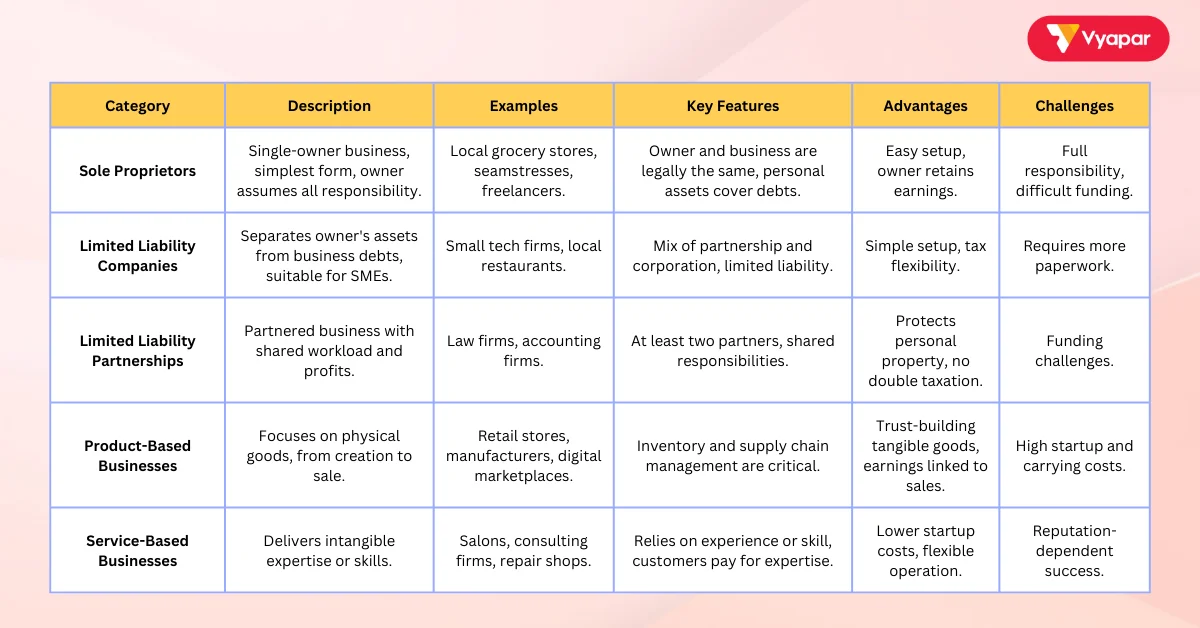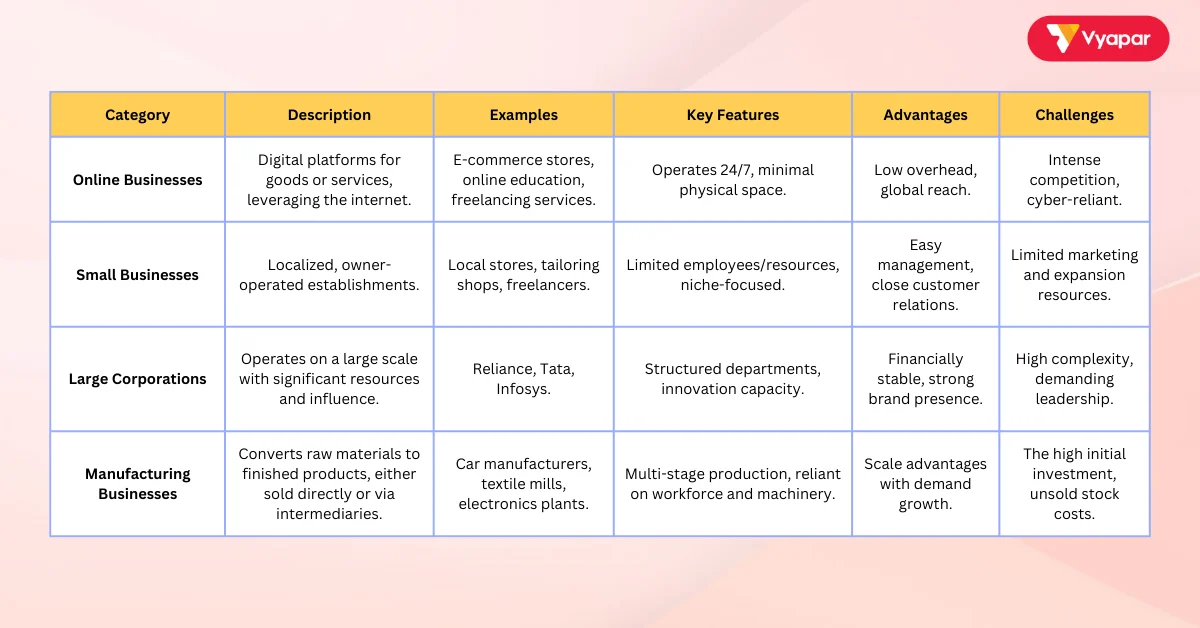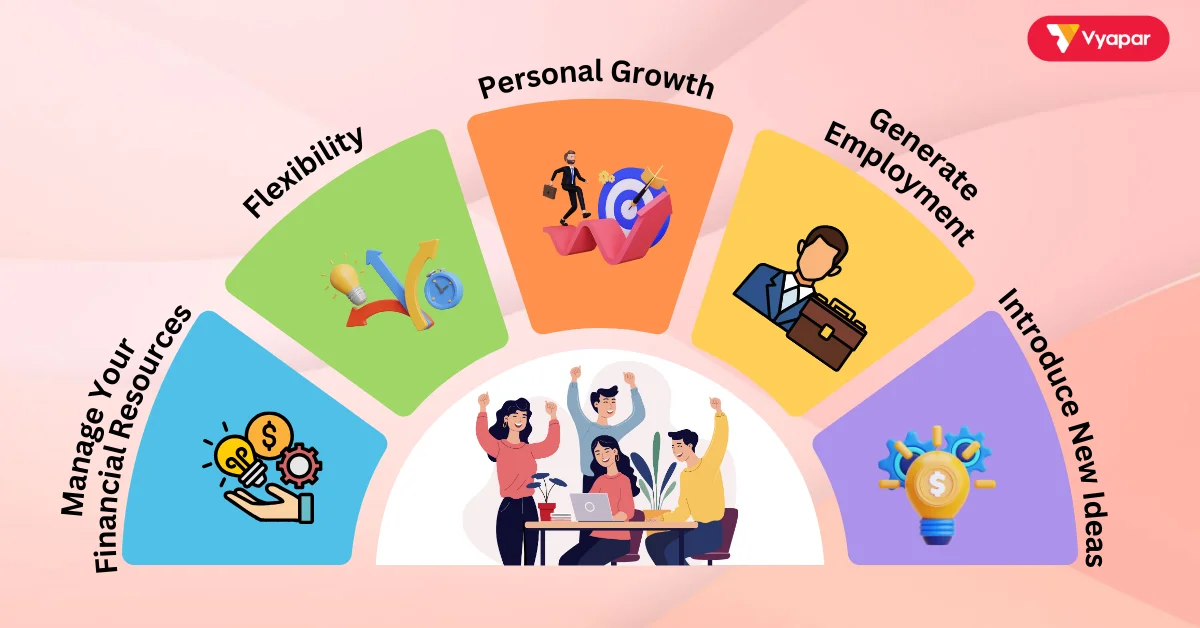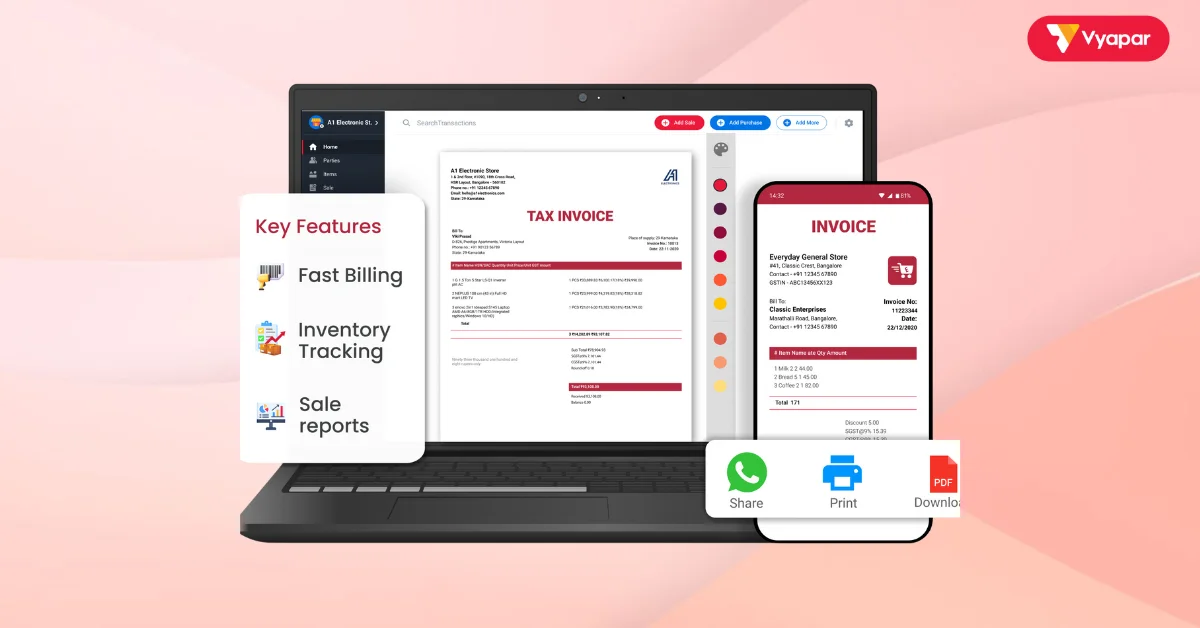Table of Contents
- Understanding a Business: Definition and Examples
- Key Takeaways About a Business
- Types of Businesses
- What Is Business Management and Why Is It Important?
- Benefits of Running a Business
- The Importance of Business Operations
- How Does a Successful Business Work?
- Research and Plans to Make Before Starting a Business
- What are the Steps to Launch a Business?
- Examples of Successful Businesses in India
- Benefits of Running Your Own Company
- How Vyapar App Can Help You to Grow Your Business
- FAQ’s
What Is A Business? A Simple Guide for Everyone
Estimated reading time: 9 minutes

A business is a group or company that sells things or services to people. In return, they make money or earn a profit.
It can be a small shop run by one person or a big company that works all around the world. The main goal of an organization is to help solve problems or meet the needs of people, while also making money.
Understanding a Business: Definition and Examples
In simple terms, it is all about providing value to people. It can involve selling products, offering services, or both. For example:
- A real estate agent assists individuals in purchasing, selling, or leasing residences and structures.
- A bakery provides its customers with cakes and bread.
- An e-commerce store delivers apparel, electronics, and food items doorstep.
Each organization has its unique way of serving customers, but the ultimate goal is to create value while making a profit.
Key Takeaways About a Business
- An Enterprise provides goods or services for money.
- It can be small, like a local grocery store, or large, like an international company.
- Its goal is to help customers while making profits.
- Organizations help the economy by creating jobs and providing important products or services.
Types of Businesses
It can be classified into several types based on their activities, ownership, and purpose. Below is a detailed explanation of each type.
Tabular Summary about Businesses:


What Is Business Management and Why Is It Important?
Business management involves organizing, planning, and running a business to achieve its goals efficiently. It covers all aspects from managing employees and resources to ensuring smooth operations and business goals.
Importance of Business Management:

- Efficient Use of Resources: Ensures the best use of time, money, and materials.
- Team Coordination: Aligns employees’ efforts toward common goals.
- Growth Planning: Helps to grow your entity and reach new customers.
- Customer Satisfaction: Maintains consistent quality in goods or services.
- Financial Health: Keeps track of expenses and income for better decision-making.
Benefits of Running a Business
- Financial Independence: It allows individuals to earn their income and control their finances.
- Flexibility: Owners can set their schedules and make decisions independently.
- Personal Growth: This builds skills like leadership, problem-solving, and decision-making.
- Job Creation: Contributes to the economy by creating employment opportunities.
- Innovation: Encourages new ideas and solutions to meet customer needs.
The Importance of Business Operations
Business operations are the daily tasks that help an organization run well. Daily operations
include managing inventory, handling money, providing customer service, and marketing.
Why Business Operations Are Important:
- Efficiency: Streamlined operations save time and reduce costs.
- Customer Satisfaction: Ensures timely delivery of quality products or services.
- Profitability: Reduces waste and improves productivity, boosting profits.
How Does a Successful Business Work?
A successful organization focuses on these key areas:
- Customer-Centric Approach: Prioritizes understanding and meeting customer needs.
- Strong Leadership: Guides employees and makes decisions that benefit your company.
- Operational Efficiency: Ensures smooth processes and avoids unnecessary delays.
- Innovation: Keeps up with market trends and introduces unique offerings.
- Consistency: Delivers quality products or services consistently to build trust.
Research and Plans to Make Before Starting a Business
- Market Research: Understand your target audience, potential customers, and competitors.
- Business Idea: Define what products or services you’ll offer.
- Financial Planning: Know how much money you need and how you’ll raise money. Estimate startup costs, revenue, and profit margins.
- Legal Requirements: Register your entity and obtain the necessary licenses.
- Set Up a Business Bank Account: Keep personal and company money separate.
- Marketing Strategy: Plan how to attract and retain customers.
What are the Steps to Launch a Business?
Starting a business involves the following steps:
- Create a Plan: Outline your goals, strategies, and expected expenses.
- Register Your Business: Get the necessary licenses and permits.
- Set Up Finances: Open a bank account and arrange funding.
- Launch Your Product or Service: Use marketing strategies to attract customers.
- Monitor Progress: Use tools like Vyapar to track income, expenses, and customer feedback.
Examples of Successful Businesses in India
- Tata Group: Diversified industries ranging from automobiles to hospitality.
- Reliance Industries: Leading in energy, retail, and telephone communications.
- Vyapar App: A business management app for small businesses in India, helping with accounting, invoicing, GST, and inventory.
- Amul: India’s dairy industry with innovative supply chains.
- Flipkart: A trailblazer in India’s online retail industry.
- Zomato: A globally recognized food delivery platform.
Benefits of Running Your Own Company

- Manage Your Financial Resources: Generate income and determine how to allocate your funds.
- Flexibility: Choose when and how to work.
- Personal Growth: Learn new skills like leadership and problem-solving.
- Generate Employment: Assist others by providing them with job opportunities.
- Introduce New Ideas: Offer unique solutions to customers.
How The Vyapar App Can Help You to Grow Your Business

The Vyapar App helps all kinds of businesses grow. It makes operations easier and improves efficiency. Here’s how it can help:
- Manage Finances Easily: Vyapar helps you track income, expenses, and profits. It gives a clear view of your company’s financial health.
- Streamline Inventory Management: Whether it’s a retail outlet or a manufacturing unit, Vyapar monitors inventory levels. It establishes warnings for low stock and aids in avoiding overstocking.
- Generate Professional Invoices: Vyapar creates GST-compliant invoices quickly, ensuring accurate billing and enhancing customer trust.
- Automate Tax Calculations: The app automates GST and other tax calculations, making tax filing easier and error-free.
- Provide Insights Through Reports: Vyapar creates detailed business reports on sales, cash flow, and expenses. These reports help you make informed decisions.
- Improve Cash Flow Management: With tools to track receivables and payables, Vyapar helps maintain a steady cash flow.
- Organize Records Well: The application consolidates all corporate information in a single location. This makes audits and following local rules easier.
By using Vyapar, companies save time, reduce mistakes, and focus on scaling operations and improving customer satisfaction.
Are you a Business Owner?
Take your business to the next level with Vyapar! Try free!
Try our Android App (FREE for lifetime)
FAQ’s
A company is any activity that provides goods or services for money.
India offers a large market, government support, and skilled workers.
Types include sole proprietors, LLCs, LLPs, online stores, and manufacturing setups.
Vyapar tracks finances, manages stock, simplifies taxes, and helps you grow efficiently.
It helps separate personal money from company funds, making accounting easier.
Related Posts:









